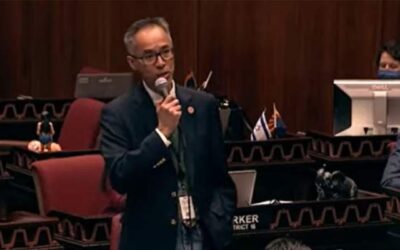By Terri Jo Neff |
Since early on in the legislative session, Arizona Rep. Bret Roberts has tried to convince his fellow lawmakers that it was crucial to protect citizens from mandatory COVID-19 vaccination demands.
A bill, HB2190, introduced by Sen. Kelly Townsend on Roberts’ behalf would prohibit companies and government agencies in Arizona from demanding proof, referred to as a vaccine passport, of someone’s vaccination status in order to receive government benefits or enter a place of business.
HB2190 stalled out but fast forward nearly three months to Ducey’s decision this week to issue an executive order banning Arizona’s universities and community colleges from mandating that students show proof of their COVID-19 vaccination status or be forced to wear masks “in order to participate in learning.”
The governor’s action came after Dr. Joanne Vogel, Vice President of Student Services for Arizona State University (ASU), announced that students who have not received the COVID-19 vaccination would be subjected to daily health checks, twice-weekly testing, and mandatory face mask use in all indoor and outdoor spaces on ASU campuses.
Rep. Travis Grantham, the Speaker Pro Tempore, issued a statement Tuesday calling for the immediate rescindment of Dr. Vogel’s COVID-19 policy or her departure from ASU. At stake is not only students’ freedom to be vaccinated or not, but the university’s finding, according to Grantham.
“I have received numerous calls from concerned parents whose kids have no other option but to attend a state university,” Grantham noted. “It’s important that this tyrannical policy must not prevent any Arizonan from accessing our state university system. Moreover, as the legislature prepares to pass a state budget for next year, I will not support funding for any state university that intends to harass or discriminate against non-vaccinated students on campus.”
Rep. Jake Hoffman also opposes the ASU policy which he called “a gross abuse of students’ liberties.” He pointed out Tuesday that the state’s universities receive hundreds of millions of dollars of taxpayer funds and that it was common knowledge lawmakers have language in the pending state budget which would prohibit ASU’s COVID-19 policy.
“They’re just basically giving the Legislature the finger and that’s a problem for our State,” Hoffman said in a radio interview. “It’s an unacceptable overreach by a political subdivision of the state.”
In announcing his executive order, Ducey called on the legislation to codify his executive order into law. The question now is whether the legislation Ducey is seeking will be HB2190 or if it will include something else.
For his part, Roberts said during a radio interview Tuesday morning that the governor’s executive order is “a good start” but he believes all Arizonans -not just students- deserve the same protections. Which would be provided by HB2190.
Roberts also said he is not surprised by the ASU vaccination dustup, although he found it interesting the University of Arizona did not try to implement such as policy. He remains hopeful his vaccine bill -or something similar- will pass.
The problem, he noted, “is future political interest” of those who have so far opposed legislating vaccine policies for private and public purposes.
“If the people make it clear that future political interest are in jeopardy then maybe there’s a chance” of passing HB2190, he said. “I put the right of the individual to make that choice (to vaccinate or not) before a business should be able to dictate whether or not you have to give up your personal medical information in order to particulate in commerce.”
Meanwhile, Sen. Michelle Ugenti-Rita provided a shout-out to Roberts for “taking an early lead on this important issue,” and called on lawmakers to prohibit vaccine passports “from ever being mandated by any government or business.”








